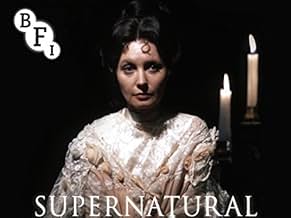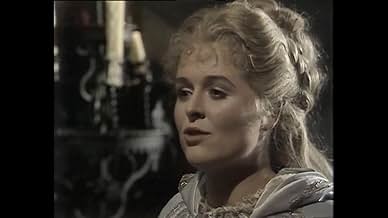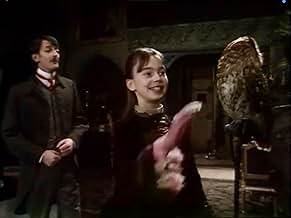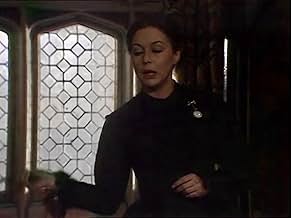Aggiungi una trama nella tua linguaChilling anthology series where membership to the secret society, The Club of the Damned, is granted through telling horror stories.Chilling anthology series where membership to the secret society, The Club of the Damned, is granted through telling horror stories.Chilling anthology series where membership to the secret society, The Club of the Damned, is granted through telling horror stories.
Sfoglia gli episodi
Recensioni in evidenza
10alsmess
There was at one time a tradition of late night horror that seemed to abound in the seventies in Britain.This is an episodic collection of tales linked together by the telling at a club of the damned.Ghosts,vampires and werewolves alongside other nightmarish scenarios (creepy Victorian dolls anyone?) and an interesting take on the Frankenstein story feature.This is what the BBC does best. Well written, intelligent and well acted stories.
This one was extra hard to get but eventually I did get my hands on clear complete set of this show....But it was well worth it...
Too bad it got cancelled early and was ahead of its time.
I highly recommend the following eps: 2. & 3. Werewolf Reunion and Countess Ilona: an excellent ep. with excellent acting especially from Billie Whitelaw. Interesting that the werewolf is not really shown fully but this adds to the flavour.
7. Night of the Marionettes: Gordon Jackson is just excellent in this ep.(he is just an excellent actor). An interesting twist on the Frankenstein story.
8. Dorabella: Dare I say probably the best ep. of the bunch. Excellent acting, story, atmosphere make this an original vampire tale and a very excellent twist ending.
Too bad it got cancelled early and was ahead of its time.
I highly recommend the following eps: 2. & 3. Werewolf Reunion and Countess Ilona: an excellent ep. with excellent acting especially from Billie Whitelaw. Interesting that the werewolf is not really shown fully but this adds to the flavour.
7. Night of the Marionettes: Gordon Jackson is just excellent in this ep.(he is just an excellent actor). An interesting twist on the Frankenstein story.
8. Dorabella: Dare I say probably the best ep. of the bunch. Excellent acting, story, atmosphere make this an original vampire tale and a very excellent twist ending.
Absolutely brilliant old BBC TV. This is the BBC during it's height, Golden Age Doctor Who, I Claudius, the M.R. James ghost stories, and it should be much more widely known. It features perhaps the creme de la creme of British acting talent at the time (Jeremy Brett, Billie Whitelaw, Robert Hardy, Denholm Elliott, Gordon Jackson - oh the cast is to die for!). Such was the talent avaliable at that time that each and every one of the main cast elevate the whole seriese far above what otherwise could have been fairly standard pop-horror, producing a real weight of gravitas and experience to the roles. The stories too however, are brilliant, I struggle really to pin point the best of the bunch, as I love them all. I have a certain soft spot for lurid, Victorianna-esque Gothic horror, I'm a sucker for it, so I'd probably like any of it. But "Night of the Marionettes" is especially good, due to the stark, amazing theatrical vivid quality to it with the genuinely unsettling marionette puppet show, shot on film as well, giving it a great, grimy, raw quality. I love also the two partner, "Countess Ilona" and "The Werewolf Reunion", largely because of the amazing cast surrounding it. A sordid collection of aristocratic monsters, Charles Kay playing a sneering snob who is little more than a grotesque sex pest, the other (played by Ian Hendry) an nihilistic war profiteer who booms his majestic voice across the hall espousing his beautiful misanthropic poetry, denouncing everything from religious faith to humanitarianism to peace, in between chuckling and stuffing his face perpetually with food. To the stuffy and uptight politician (Edward Hardwicke) a man so seemingly inhuman and robotic he feels more like an extension of the cold, glassy monocle he polishes repeatedly. Along with the foppish pianist played by Hugo Hoffman, they each get a gruesomely delicious fate, and it sparkles watching these actors, the peak of British acting talent bounce of one another, each unique in their personalities and personal philosophies, yet each acting like a kind of reflection of one another, all representatives of the casual culture of distain for humanity and disregard for women that marks this Prussian culture of aristocratic degeneracy and back stabbing grubby reactionarism.
Jeremy Brett too deserves special praise in "Mr. Nightingale". The story itself is very peculiar, yet he absolutely shines, doing what he would later master as Sherlock Holmes, every line shot out of his mouth like bullets from a Gatling gun, his teeth baring, his eyes bulging. He's just brilliant in how bizarre and malignant he can be.
The writing is also superb. It's very, very mid 70s BBC (anyone who watches Doctor Who or I, Claudius at the time will know exactly what I mean). Lots of harsh looking video, flare bulbs from bright lights, small sets like theatre, minimal camera movements, static shots of one or two actors. But I have to say It's brilliant for this series, the often highly loquacious dialogue being allowed to simply flow from the brilliant actors hired, allowing the poetic nature of it to drive the story. Atmosphere and tension and personal drama are at the forefront, not special effects (which, knowing the quality of some of that at the time, was probably wise).
It's a lost gem in my opinion, and should be far more widely known. I regularly rewatch it with a smile on my face, delighted by the weird cast of ghouls who come to recite their stories, diverse in their range and setting (and even period).
Jeremy Brett too deserves special praise in "Mr. Nightingale". The story itself is very peculiar, yet he absolutely shines, doing what he would later master as Sherlock Holmes, every line shot out of his mouth like bullets from a Gatling gun, his teeth baring, his eyes bulging. He's just brilliant in how bizarre and malignant he can be.
The writing is also superb. It's very, very mid 70s BBC (anyone who watches Doctor Who or I, Claudius at the time will know exactly what I mean). Lots of harsh looking video, flare bulbs from bright lights, small sets like theatre, minimal camera movements, static shots of one or two actors. But I have to say It's brilliant for this series, the often highly loquacious dialogue being allowed to simply flow from the brilliant actors hired, allowing the poetic nature of it to drive the story. Atmosphere and tension and personal drama are at the forefront, not special effects (which, knowing the quality of some of that at the time, was probably wise).
It's a lost gem in my opinion, and should be far more widely known. I regularly rewatch it with a smile on my face, delighted by the weird cast of ghouls who come to recite their stories, diverse in their range and setting (and even period).
While many people are familiar with the anthologies of Hammer House of Horror and Amicus productions, I had to learn about this particular BBC horror series from a random YouTube video. I am delighted to have found something compelling, well-written and of relatively high quality if you like subtle horror from the time period.
The magnificent queer episode Viktoria was a huge surprise considering the conventional morality of mid-20th century Brits (at least the middle class sort who were in charge) and the legendary censorship of Video Nasties in the following decades. Clearly it was inspired to a degree by the German 1930s film Viktor und Viktoria, better known to English speaking audiences in the 1982 Julie Andrews version.
The magnificent queer episode Viktoria was a huge surprise considering the conventional morality of mid-20th century Brits (at least the middle class sort who were in charge) and the legendary censorship of Video Nasties in the following decades. Clearly it was inspired to a degree by the German 1930s film Viktor und Viktoria, better known to English speaking audiences in the 1982 Julie Andrews version.
When I first found this website about four years ago I remember trying to get information on THE SUPERNATURAL but there was none and it's only very recently someone has gone to the time and trouble of registering it . Hopefully someone can contribute more info at a later date .
As for myself I can remember bits of it . The title credits start with a blast of organ music with the camera panning across Gothic images of gargoyles . I remember it seemed very effective at the time when I was aged ten or eleven years old .
Each episode was self contained with someone being invited to an English Victorian club where they had to relate a true supernatural event in their life to be allowed membership and as with all these type of anthology stories they'd be a twist at the end . One of the stories was spread over two episodes and featured several gentlemen staying at a remote mansion in central Europe where a werewolf stalks them , another featured a doll that comes to life while another episode stars Gordon Jackson in a tale that reworks Frankenstien . It's interesting to note that this episode is unique in that the club members think this tale has no basis in fact , it's a made up story
The production values were typical of the BBC of the time , ie it was made rather cheaply with very obvious studio exteriors . I also recall letters to the Radio Times were very mixed with some viewers thinking THE SUPERNATURAL was a load of rubbish while some thought it was a fairly good drama . I personally liked watching it on a Saturday night but there again I was still only a child and it should also be pointed out that the BBC dropped the series after one season while the IMDb hasn't exactly been deludged with either info or reviews for this show which unfortunately may say something about its quality
Update Nov 2014 . After seeing the BBC 4 repeats it's as I suspected . Painfully slow , stagey acting and static directing and twists you can probably see a coming a mile away
As for myself I can remember bits of it . The title credits start with a blast of organ music with the camera panning across Gothic images of gargoyles . I remember it seemed very effective at the time when I was aged ten or eleven years old .
Each episode was self contained with someone being invited to an English Victorian club where they had to relate a true supernatural event in their life to be allowed membership and as with all these type of anthology stories they'd be a twist at the end . One of the stories was spread over two episodes and featured several gentlemen staying at a remote mansion in central Europe where a werewolf stalks them , another featured a doll that comes to life while another episode stars Gordon Jackson in a tale that reworks Frankenstien . It's interesting to note that this episode is unique in that the club members think this tale has no basis in fact , it's a made up story
The production values were typical of the BBC of the time , ie it was made rather cheaply with very obvious studio exteriors . I also recall letters to the Radio Times were very mixed with some viewers thinking THE SUPERNATURAL was a load of rubbish while some thought it was a fairly good drama . I personally liked watching it on a Saturday night but there again I was still only a child and it should also be pointed out that the BBC dropped the series after one season while the IMDb hasn't exactly been deludged with either info or reviews for this show which unfortunately may say something about its quality
Update Nov 2014 . After seeing the BBC 4 repeats it's as I suspected . Painfully slow , stagey acting and static directing and twists you can probably see a coming a mile away
I più visti
Accedi per valutare e creare un elenco di titoli salvati per ottenere consigli personalizzati
- How many seasons does Supernatural have?Powered by Alexa
Dettagli
Contribuisci a questa pagina
Suggerisci una modifica o aggiungi i contenuti mancanti



































